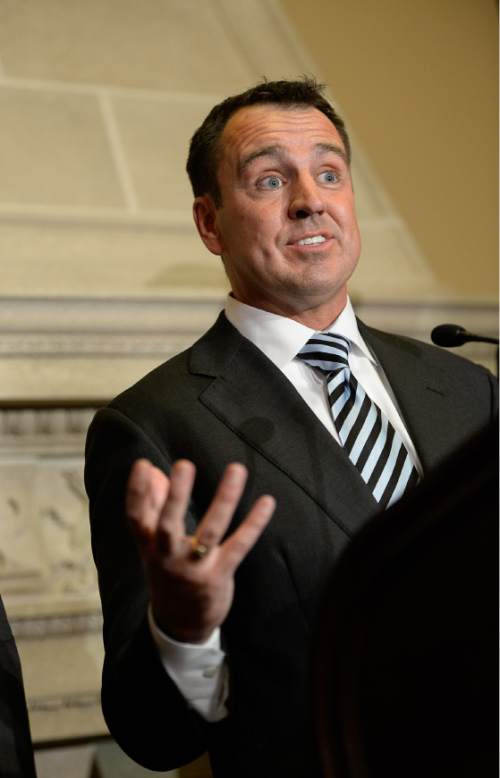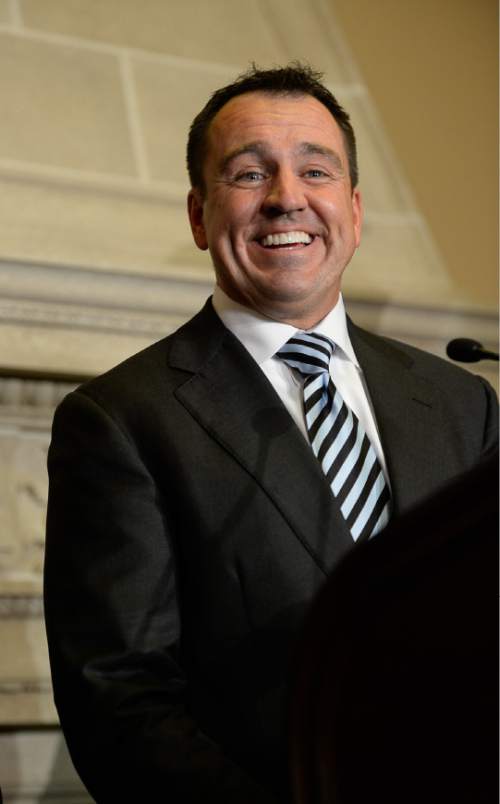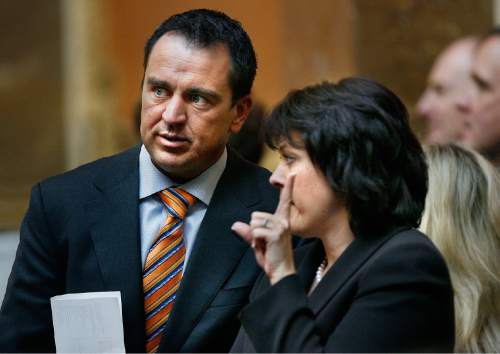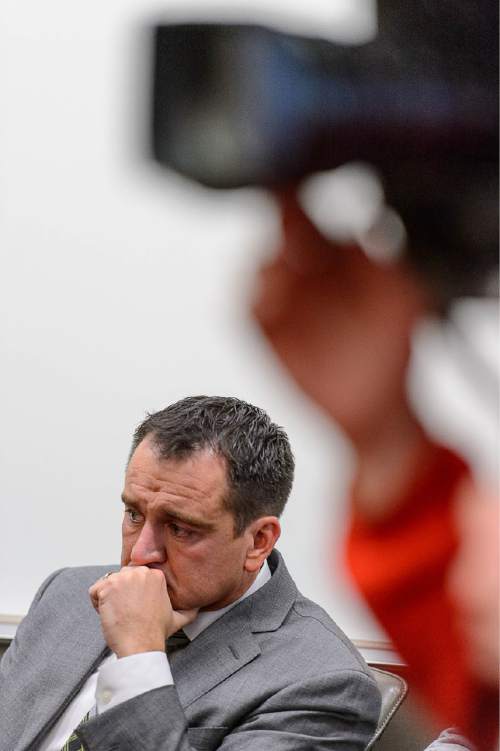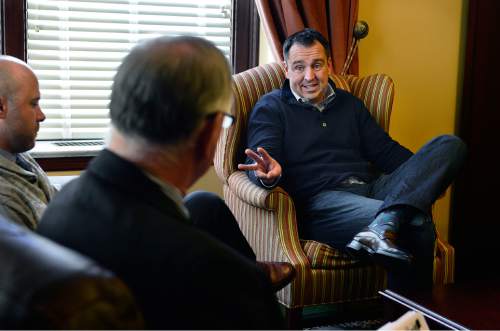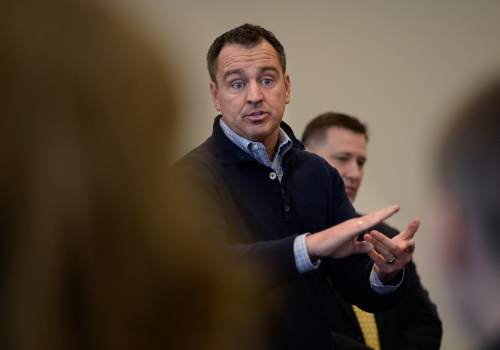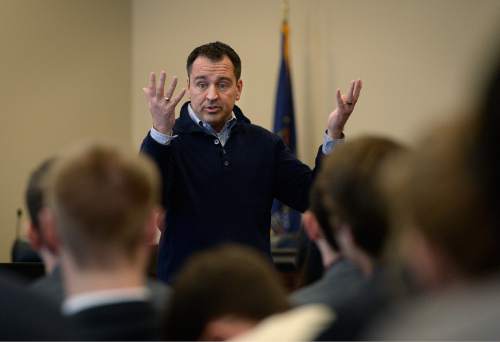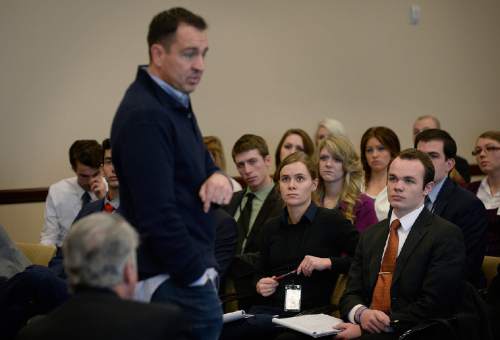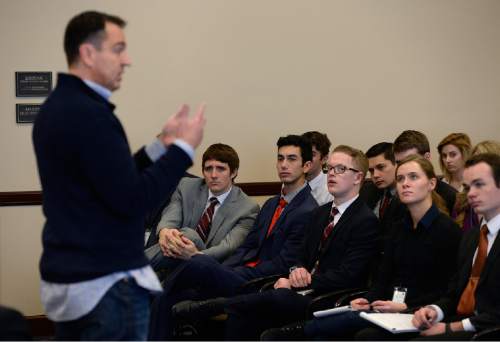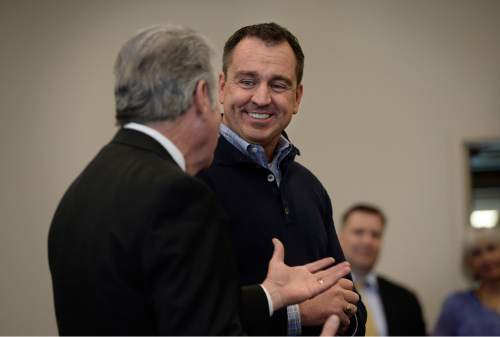This is an archived article that was published on sltrib.com in 2015, and information in the article may be outdated. It is provided only for personal research purposes and may not be reprinted.
In each of his stylish suits and fashionable shirts, Greg Hughes has had the letters "LB" stitched into the fabric. It stands for "Lucky Bastard" and serves as a reminder of where he came from and the life he now enjoys.
Hughes never knew his father. His mother was a go-go dancer and art student, and her son grew up in blue-collar, rough-and-tumble neighborhoods, slugging his way through childhood with flailing fists and bloodied lips.
He survived brawls and boxing bouts, a car crash that crushed both his legs, allegations of ethical misconduct that threatened his political career and now is poised to be sworn in Monday as the next speaker of the Utah House.
"Greg grew up really poor with very limited opportunities," said Sen. Steve Urquhart, R-St. George, who traveled to Pittsburgh and met Hughes' aunt and uncle.
"The thing he had is he had a few friends and the Pittsburgh Steelers," Urquhart said. "And so, to me, seeing where he came from and hearing stories about it, it's just a complete success story. It proves people can claw their way up and really accomplish something, even when they come from a very, very humble beginning."
As a legislator, Hughes brought the same brawler's approach he developed early in life, attacking issues and debates with a fiery intensity that made him a force in Utah's Capitol and earned him the ire of some.
—
Humble beginnings • Maxine James was shopping at Kaufmann's department store in downtown Pittsburgh when she looked across the street and was stunned to see her daughter, Marguerite, with a round belly, nearly nine months pregnant. Maxine crossed in the middle of traffic, grabbed her daughter by the arm and took her home.
Those two women and Marguerite's sister raised and cared for the young Greg Hughes, who was given his father's name. Marguerite remarried when the boy was 4 years old, and the new family bounced from place to place, attending a new school nearly every year, before his parents divorced five years later.
His mother was in sales, so it was feast or famine in the household. One month, commissions would be booming and Hughes would get an electric guitar. The next month, the electricity would be shut off. In seventh grade, Hughes went to live with his stepfather after the IRS seized his mother's home because she hadn't paid her taxes.
At each new school, Hughes said, the way to make friends was to get into fights.
"You would have kids who would test you … and if you pushed back, you didn't have any problem," Hughes said. "If you were a kid who backed down or were afraid, it would get worse for you, and I figured that out pretty quick."
The boys would square off, throw some punches, end up rolling in the dirt and come away friends.
Hughes was also a latch-key kid, coming home after school and watching TV until his mother got home. One day, she came home from work early, Hughes recalls, and spotted some bikes by the woods near their house. His mother, wearing heels, hiked into the woods and caught her 8-year-old son smoking a cigarette.
"My mother sees me and she just starts to sob," Hughes said. "She's not even mad. She's just devastated. … She didn't want to leave me alone during the day, so she made me go to this place called the Richland Youth Foundation, where you put troublemaker kids that can't be supervised. And I got in three fights on my first day."
The staff at Richland tried to channel some of Hughes' energy, sending him upstairs to the boxing gym, where they started training him in sparring. It was a pivotal moment in his life, sparking a love for the sport that Hughes carries to this day.
—
A knock at the door • The other turning point for Hughes came years earlier, when two handsome Mormon missionaries knocked on his mother's door. She let them in and was baptized into the faith fairly quickly.
"I used to joke that my mother was Mormon because the Jehovah's Witnesses didn't get to her first," Hughes said.
The LDS Church provided some stability for Hughes because there were few enough Mormons in Pittsburgh that, even as he bounced between schools, his ward stayed the same. Sometimes that meant traveling more than an hour to church on Sunday.
Hughes didn't embrace the faith until he was in 10th grade. Skipping school one day, he was riding in a Volkswagen Beetle his friend drove into a telephone pole at about 30 mph.
Hughes had shards of glass embedded in his face and in his mouth and was spitting out broken teeth. A Tears For Fears song was playing and Hughes says he remembers reaching over to turn off the radio.
"I was a skinny kid and I looked down and I see these giant legs and they just twist … both of them before the knees," Hughes remembers. "I don't know where my friend Dave starts and I end in this mess … and I touch these legs and I don't feel them and I look at Dave and say, 'Your legs man, look at your legs.' And he jumps and gets out of the car and they're still there and I realize it's me. And I think I'm paralyzed."
He was airlifted to Allegheny Hospital, where medical staffers called his mother, who was convinced there was a mistake. "I'm sorry," she said. "My son is in school."
He had 13 pins inserted in one leg, nine in the other. Church leaders came and gave him a blessing, which Hughes says he's convinced helped him heal without serious deformities.
After that, he said, he got more serious about church. He began dating a Mormon girl, whose family insisted she marry a returned missionary.
"If they'd said she'll never marry anyone but a trapeze artist, I'd have joined the circus right there," he said. Hughes, who never did marry that girl, put in his application and served a two-year mission in Australia and Papua New Guinea for The Church of Jesus Christ of Latter-day Saints.
Before he left, Hughes got his first taste of politics.
He had a friend who was working for Pennsylvania's national committeewoman, who was a cousin of then-Vice President George H.W. Bush and got Hughes a job as the state scheduler for Bush's 1988 White House bid.
It was a big responsibility, juggling scheduling requests for all of the dignitaries coming through the crucial swing state and when Bush won, Hughes traveled to Washington, D.C., for the inauguration, sleeping on the couch of the Pennsylvania hospitality suite, because he couldn't afford a room.
A friend from that campaign would help change the direction of Hughes' life.
—
The Utah connection • Joe Waldholtz was a young Republican operative from Pittsburgh and was dating the head of the National Young Republicans at the time, a Utahn named Enid Greene.
When Hughes came back from his mission, he figured he would go to work on the Bush re-election campaign — until he went to a Young Republicans event and heard Greene speak.
"I was ready to go 'Braveheart' right there listening to her. I thought she was spot on," Hughes said. "I just made a decision right there, I'm not going back to Pittsburgh. … I wanted to help Enid."
He moved to Utah, living in the basement of her Federal Heights home and helped with her 1992 congressional campaign — which she ended up losing to Democrat Karen Shepherd.
"Greg, back then, was incredibly energetic, very, very loyal and willing to stand up to anybody who said anything bad about his friends," Enid Greene Mickelsen recalls today. "He was very idealistic, in a good way, and I think more conservative than he is now."
Hughes earned an associate degree from then-Utah Valley State College and enrolled in Brigham Young University. In 1993, his hand was crushed when he was one of several students who tackled Cody Judy when he threatened the life of LDS Church President Howard W. Hunter. Hughes still has a plate in the hand.
—
Scandal • In 1995, after it was revealed that Joe Waldholtz had illegally funneled $1.8 million from Greene's father into his wife's 1994 successful campaign and Waldholtz disappeared for several days, Greene held a tear-filled marathon news conference. One reporter from a national publication was pushing her on a particular question when Hughes shouted a profanity from the back of the conference room and told him to shut up.
Greene stepped down after serving a single term and Waldholtz went to prison.
In 2002, several years after meeting and marrying his wife, Krista, Hughes re-emerged in politics, winning a seat in the state Legislature after then-Rep. John Swallow left to run for Congress.
In his first session, Hughes unsuccessfully pushed for a cap on the growth of the state budget, aiming to keep state government in check.
In 2005, he became the first sitting lawmaker to be appointed to the board of the Utah Transit Authority, which he later would oversee as chairman, working behind the scenes and in front of the cameras to tamp down controversy over a scathing audit.
He co-founded the Conservative Caucus in 2006, leading lawmakers who were then the body's most strident Republicans.
—
Ethics trial • In 2008, Hughes was the subject of an ethics complaint — a rare use of the ethics process — over allegations that he promised $50,000 in campaign funds to a legislator if she would change her vote on a highly controversial bill to create private school vouchers in the state. The complaint also accused Hughes of bullying lobbyists and legislators and other misdeeds.
Hughes argued the complaint was a political hatchet job, coming just a few weeks before the election in an attempt to torpedo his campaign.
After seven days of closed-door testimony, the House Ethics Committee voted not to take action against Hughes, although the panelists deadlocked along party lines on some of the allegations, wrote a letter criticizing him for "behavior unbecoming a member of the Utah House" and requested he apologize to some of those involved.
David Irvine, a former legislator and attorney who helped prepare the complaint against Hughes, said it was a difficult period for everyone involved, but the witnesses he interviewed were "very, very emphatic" that they had been offered campaign cash if they would change their vote.
Irvine also said there was a sense from many that the Legislature's ethics process and rules were deeply flawed. That was one of the factors that led Irvine and others to form Utahns for Ethical Government, which attempted but ultimately failed to put an initiative on the ballot to impose sweeping new ethics rules in the state.
The Legislature also overhauled its ethics process in the aftermath of the episode, although Irvine said the issue of how legislators use their position and the conflicts of interest that can arise "is as alive and acute today" as ever.
"I don't know that anybody wishes [Hughes] anything but success and good in the new assignment," Irvine said, "and I suspect that all of us manage to learn from difficult experiences and I'd be surprised if Representative Hughes didn't learn from this one."
Hughes is adamant that he did nothing unethical, but he said he has learned to be more cautious with how he conducts himself.
"I thought brutal honesty was a virtue," he said, "and my brutal honesty opened me up for my political antagonists to really not like me, to be willing to do some extreme things.
"I'm still passionate, but I don't want to leave myself vulnerable to attacks like that, so I learned a big lesson through that experience," Hughes said. "And you know what? I think it makes me a better lawmaker today."
—
Moving on • Hughes won re-election that year and in 2009 carried a bill to overhaul Utah's liquor laws — doing away with private-club requirements for bars but requiring driver licenses to be scanned at the door and changing how much alcohol can be in drinks.
In 2011, he sponsored legislation creating a commission to look at moving the Utah prison from its current location inside his Draper district, a change that is being studied and has become a politically contentious issue.
Throughout his career he has also been active on veterans issues, sponsoring legislation to give tuition discounts to servicemen and women who receive the Purple Heart for being wounded in action and helping to build three veterans nursing homes in the state.
During his down time — which is less frequent, as of late — Hughes will still lace up the gloves to blow off steam at the gym run by his friend Eddie "Flash" Newman.
Hughes and Gary Nordhoff, his business partner, formed a boxing-promotion company to sponsor one of Newman's fighters, Chris "Kid Kayo" Fernandez, a Highland High graduate who won the World Boxing Union.
Newman says Hughes takes that boxer's mentality with him to Utah's Capitol.
"His passion is boxing. … Maybe that's why he fights so hard up in the House," Newman said. "If you had to go to war and you need someone close to you, he's a good fighter to have on your side."
gehrke@sltrib.com Twitter: @RobertGehrke —
Getting involved
Want to track legislation in the Legislature? Need to contact a lawmaker? Check out the legislative primer. › A13


